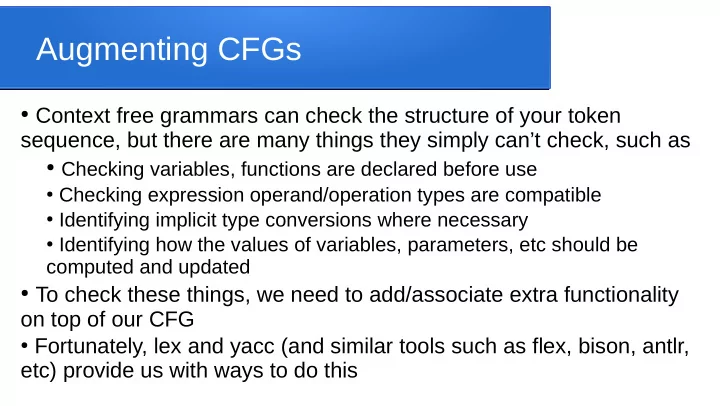

Augmenting CFGs ● Context free grammars can check the structure of your token sequence, but there are many things they simply can’t check, such as ● Checking variables, functions are declared before use ● Checking expression operand/operation types are compatible ● Identifying implicit type conversions where necessary ● Identifying how the values of variables, parameters, etc should be computed and updated ● To check these things, we need to add/associate extra functionality on top of our CFG ● Fortunately, lex and yacc (and similar tools such as flex, bison, antlr, etc) provide us with ways to do this
Context and grammars ● Context free grammars apply their rules without (wait for it) knowledge of their context! ● Thus a rule knows nothing about what happens before or after, and is unable to do things like typecheck, or check for declaration- before-use ● Our “augmentations” involve communicating extra information with each applied derivation step, identifying the context it is operating in ● this can be by associating extra data with the derivation step itself, or through global tables (so data can be looked up as needed)
Example: simple expression ● Consider an expression like x*y: we need to know the data type for each, whether they have been declared, which specific variable they refer to in overlapping scopes (e.g. if there is a local x and a global x) ● Consider a possible derivation mult_expr mult_expr MULT simple * IDENTIFIER simple y IDENTIFIER x
Passing info up/down the tree ● Our parse trees can be generated/analyzed recursively, from our top “start” non-terminal: the leaves or bottom layer of the recursion is our set of tokens ● As the tree is constructed (the top-down recursive calls) we can theoretically pass environmental context, such as the current scope, the currently declared variables, etc ● As the tree is evaluated (the bottom-up returns from the recursive calls) we can fill in information such as the specific types of operands in an expression
A lookup table approach ● Many compilers store information about symbols in a table as they process the source code, giving each symbol a unique name, storing its type, scope, value (if known), etc ● They can also store information about scopes, giving each scope a unique identifier and tracking which scopes are nested in which others ● Between the two tables, whenever a symbol is used in the source code it is possible to check it has been declared (and in which scope) and perform type-checking
A lispy approach ● An alternative to global symbol tables is to pass each function a list of its environment values (which scope it is in, what variables/functions are visible, what their values are, etc) ● Recall that the structure of lambda-block-closures and lambda functions in gcl included three environment lists, containing just such information ● The environment data passed can become get quite large, but it also enables lisp functions to parse their own environment information
lex and yacc ● We’ll do some work with lex and yacc, each of which provides us with the ability to ● associate a struct with tokens/nonterminals, containing relevant data ● create C data types and global variables usable in those derivation steps ● run C code when a derivation step is applied: e.g. to apply type checking, or to act as a compiler or interpretter and translate the source code into something else
Recommend
More recommend